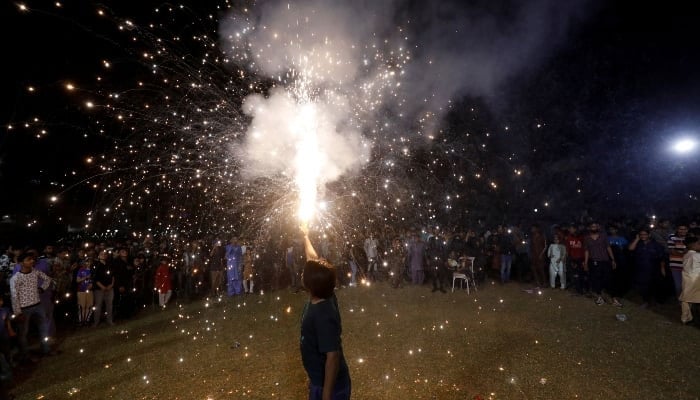Resolutions for 2025
Over past few years, Pakistan has faced some of most difficult economic times in its history, teetering on brink of default
As Pakistan steps into 2025, it is still carrying baggage from 2024. So will this year be a mere repetition of the past, or can we finally turn the tide? Politics, terrorism, climate change, social issues, internet accessibility, education, healthcare – the challenges are immense, but the opportunities for change are equally significant. The year 2024 was marked by political turbulence, institutional shifts, and faint glimmers of economic recovery. As we usher in a new year, there is cautious optimism – especially in light of Prime Minister Shehbaz Sharif’s announcement of the ambitious economic reforms package, ‘Uraan Pakistan.’ The plan aims to boost economic growth and improve the lives of ordinary Pakistanis. In his address, the PM emphasised that achieving macroeconomic stability in 2024 required navigating enormous challenges, but stressed that the future depends on unity of thought and action.
Unity is indeed the key to it all. Over the past few years, Pakistan has faced some of the most difficult economic times in its history, teetering on the brink of default. However, the country narrowly avoided bankruptcy, secured a new IMF bailout package, and set the economy on a path toward stability. Moving forward, the transition from economic stability to sustained economic growth requires political consensus. This was echoed by Finance Minister Muhammad Aurangzeb, who recently urged all stakeholders to evolve a “charter of economy” for long-term stability. Observers rightly point out that political stability is a prerequisite for economic growth. The recent initiation of talks between the PTI and the government – if successful – could herald a new era of political stability. In the past, political parties have sabotaged the economy for their own gains. When former prime minister Imran Khan faced a no-confidence vote, he derailed the IMF programme by announcing unsustainable subsidies. Similarly, the PTI’s actions in Khyber Pakhtunkhwa and Punjab in 2022 jeopardised IMF agreements, and even in 2024, the party attempted to block critical financial deals. To prevent such disruptions, it is imperative that all political parties sign a charter of economy. This consensus would ensure that economic policies remain consistent, regardless of who holds power.
Beyond the economy, there is an urgent need to address political chaos. Our hope for 2025 is an end to political victimisation and the toxic polarisation that has plagued the nation since 2022. Political rivals must learn to coexist without descending into personal enmity. It is time to dismantle the hybrid political model that has disenfranchised the public and usher in an era where democracy and governance take precedence over power struggles. While 2024 was fraught with political upheaval, it was also a year of triumphs in sports. Arshad Nadeem’s Olympic gold medal was a historic moment for Pakistan, and cricket brought us moments of joy and unity. The upcoming Champions Trophy, to be hosted in Pakistan, will be another milestone. Such achievements offer a glimpse of what is possible when the nation rallies behind a common cause. As we look to 2025, let us hope for a year defined by progress rather than paralysis. Let it be a year where political leaders prioritise the nation over their egos, where economic policies are protected from partisan sabotage, and where the people of Pakistan finally see the promise of stability, growth, and unity realised. The challenges are formidable, but with collective resolve, this can be the year we start writing a different story for Pakistan.
-
 'Too Hard To Be Without’: Woman Testifies Against Instagram And YouTube
'Too Hard To Be Without’: Woman Testifies Against Instagram And YouTube -
 Kendall Jenner Recalls Being ‘too Stressed’: 'I Want To Focus On Myself'
Kendall Jenner Recalls Being ‘too Stressed’: 'I Want To Focus On Myself' -
 Dolly Parton Achieves Major Milestone For Children's Health Advocacy
Dolly Parton Achieves Major Milestone For Children's Health Advocacy -
 Oilers Vs Kings: Darcy Kuemper Pulled After Allowing Four Goals In Second Period
Oilers Vs Kings: Darcy Kuemper Pulled After Allowing Four Goals In Second Period -
 Calgary Weather Warning As 30cm Snow And 130 Km/h Winds Expected
Calgary Weather Warning As 30cm Snow And 130 Km/h Winds Expected -
 Maura Higgins Reveals Why She Wears Wigs On 'The Traitors' And What Her Real Hair Is Like
Maura Higgins Reveals Why She Wears Wigs On 'The Traitors' And What Her Real Hair Is Like -
 Brandi Glanville Reveals Shocking Link Of Facial Issues To Leaking Implants, Claims 'no' Support From Ex Eddie Cibrian
Brandi Glanville Reveals Shocking Link Of Facial Issues To Leaking Implants, Claims 'no' Support From Ex Eddie Cibrian -
 Who Is Rob Rausch’s Girlfriend? 'The Traitors' Winner Linked To Kansas City Woman
Who Is Rob Rausch’s Girlfriend? 'The Traitors' Winner Linked To Kansas City Woman -
 Bobby J. Brown, 'Law & Order' And 'The Wire' Actor, Dies At 62
Bobby J. Brown, 'Law & Order' And 'The Wire' Actor, Dies At 62 -
 Netflix Gives In As Paramount Offers Massive Breakup Fee To Step Away From Warner Bros. Discovery Bid
Netflix Gives In As Paramount Offers Massive Breakup Fee To Step Away From Warner Bros. Discovery Bid -
 Who Won 'Traitors' Season 4? Rob Rausch Claims $220,800 Grand Prize
Who Won 'Traitors' Season 4? Rob Rausch Claims $220,800 Grand Prize -
 Niall Horan Shares Update On New Music On The Way
Niall Horan Shares Update On New Music On The Way -
 Backstreet Boys Member Brian Littrell Refiles Trespassing Lawsuit Against Florida Retiree
Backstreet Boys Member Brian Littrell Refiles Trespassing Lawsuit Against Florida Retiree -
 Kate Middleton Dubbed ‘conscious Shopper’ By Famous Fashion Expert
Kate Middleton Dubbed ‘conscious Shopper’ By Famous Fashion Expert -
 Princess Catherine Joins Volunteers In Newtown During Powys Visit
Princess Catherine Joins Volunteers In Newtown During Powys Visit -
 Shamed Andrew Thought BBC Interview Was ‘time To Shine,’ Says Staff
Shamed Andrew Thought BBC Interview Was ‘time To Shine,’ Says Staff




